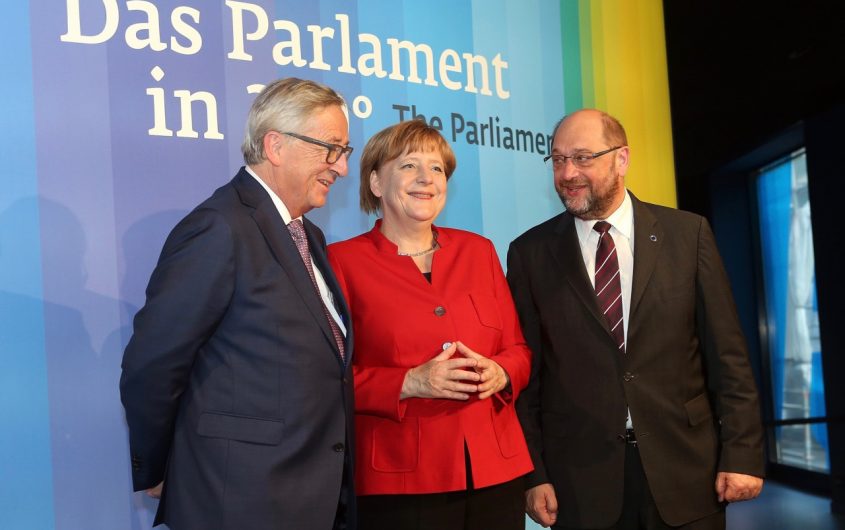
Creative Commons
For Germany’s Social Democrats, a Chance to be Europe’s Superman

Peter S. Rashish
Vice President; Director, Geoeconomics Program
Peter S. Rashish, who counts over 30 years of experience counseling corporations, think tanks, foundations, and international organizations on transatlantic trade and economic strategy, is Vice President and Director of the Geoeconomics Program at AICGS. He also writes The Wider Atlantic blog.
Mr. Rashish has served as Vice President for Europe and Eurasia at the U.S. Chamber of Commerce, where he spearheaded the Chamber’s advocacy ahead of the launch of the Transatlantic Trade and Investment Partnership. Previously, Mr. Rashish was a Senior Advisor for Europe at McLarty Associates, Executive Vice President of the European Institute, and a staff member and consultant at the International Energy Agency, the World Bank, UNCTAD, the Atlantic Council, the Bertelsmann Foundation, and the German Marshall Fund.
Mr. Rashish has testified before the House Financial Services Subcommittee on International Monetary Policy and Trade and the House Foreign Affairs Subcommittee on Europe and Eurasia and has advised three U.S. presidential campaigns. He has been a featured speaker at the Munich Security Conference, the Aspen Ideas Festival, and the Salzburg Global Seminar and is a member of the Board of Directors of the Jean Monnet Institute in Paris and a Senior Advisor to the European Policy Centre in Brussels. His commentaries have been published in The New York Times, the Financial Times, The Wall Street Journal, Foreign Policy, and The National Interest, and he has appeared on PBS, CNBC, CNN, NPR, and the BBC.
He earned a BA from Harvard College and an MPhil in international relations from Oxford University. He speaks French, German, Italian, and Spanish.
It was 80 years ago this year that DC Comics first published Superman, and with this comic book series launched a franchise of superheroes that shows no sign of losing its hold on the imagination of adults and children alike.
Much as politicians, no strangers to self-confidence, sometimes like to think of themselves in heroic terms, there are perhaps thankfully few moments in public life that require the superhuman displays of strength and derring-do that fill the works of this popular comics genre.
Yet with the European Union—and in particular the Eurozone—facing a generational choice about its future, now just might be one of those times for politicians to don their capes and come to the continent’s rescue.
A January 17 paper by fourteen respected German and French economists put it this way:
“The euro area’s inability to deal with insolvent countries other than through crisis loans conditioned on harsh fiscal adjustment has fueled nationalist and populist movements in both debtor and creditor countries. The resulting loss of trust may eventually threaten not just the euro, but the entire European project.”
France’s president Emmanuel Macron seems to understand this, and made sweeping proposals for Eurozone reform in a much-noticed speech right after the German elections last September. Just in case the Germans themselves did not grasp that the Eurozone’s future was the major issue at stake in that vote (see my post“Voting for the Eurozone on September 24”), with the timing of his remarks Macron offered a gentle reminder.
As the German Social Democratic Party (SPD) meets this Sunday to decide whether to join another Grand Coalition with Chancellor Angela Merkel’s Christian Democratic Union (CDU), it needs to keep European prosperity front and center. There is simply no other issue—not health insurance, not taxes—that comes anywhere near the importance of ensuring the stability and economic dynamism of the Eurozone.
The SPD doesn’t need to look far for inspiration: in the January 12 document outlining the prospective coalition’s goals, the SPD was the big winner on Europe. Not only does the draft lead with an eloquent appeal to European solidarity, but in its specific policy proposals it reflects core SPD beliefs like the need for more resources to create a bespoke investment budget for the Eurozone. When the agreement states that “Investments in Europe are investments in a bright future for our country” and that “Growth and prosperity in Germany are intimately linked with growth and prosperity in Europe,” the weight of the SPD is clear.
A poll this week by RTL/n-tv showed that 61 percent of SPD voters are in favor of a renewed Grand Coalition. At the same time, 48 percent of the party’s voters are unhappy with its zig-zag course—from participation in the last Grand Coalition, to the decision to go into opposition after the recent elections, to the return to negotiations with the CDU to form another government.
But if there is one thing that the SPD has shown constancy about, it is its commitment to strengthening European institutions. We will see on Sunday if that determination is translated into a “yes” vote on a new government.









